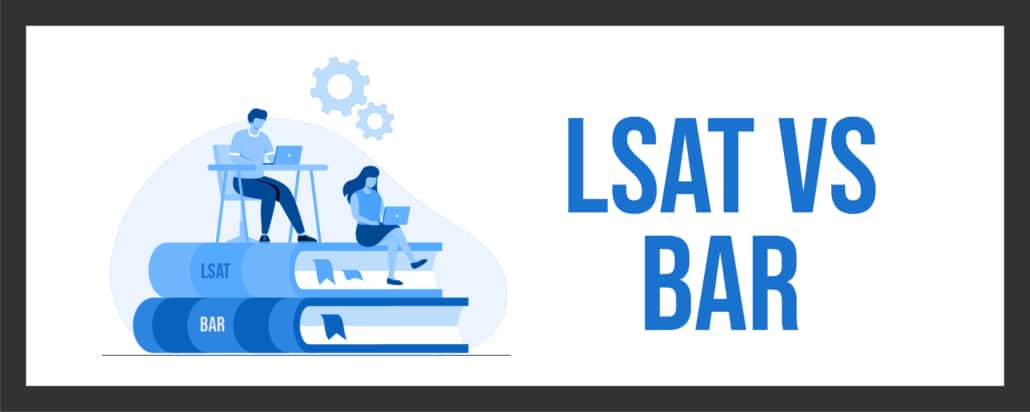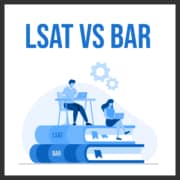
LSAT vs Bar exam?
If you’re a potential law student or just someone interested in what it takes to become an attorney, you may be wondering about the differences between these two exams.
Think of your journey to becoming a lawyer as a race. It’s a test of endurance, strategic planning, and rigorous training, with two major hurdles along the way – the Law School Admission Test (LSAT) and the Bar exam. The LSAT marks the starting line of this race, serving as your entry ticket into the competitive world of law schools. It tests your critical thinking, logical reasoning, and reading comprehension skills to gauge your potential to succeed in law school.

On the other hand, the Bar exam is the finish line, a formidable test of all the legal knowledge and skills you’ve acquired during your time at law school. Passing this exam is a crucial milestone that confers the coveted title of a certified attorney, allowing you to practice law in a particular jurisdiction. According to the National Conference of Bar Examiners, in 2022, a whopping 80% of law school graduates passed the Bar exam on their first attempt.
Joining this coveted crew means understanding the differences between these two exams, thus, becoming akin to understanding the roadmap of your marathon journey toward a legal career.
Let’s unpack what that entails, shall we?
Introduction to Legal Examinations
Whether it’s the LSAT (Law School Admission Test) taken by prospective law students, or the Bar examination taken by law graduates seeking to practice law, each test represents a significant milestone.
The LSAT and Bar exams, though both related to the field of law, serve entirely different purposes and require different skill sets. These exams lay the foundation for one’s legal career, testing not just knowledge but analytical reasoning, logical thinking, and comprehension skills.
But what’s the difference?
The LSAT Uncovered
The LSAT is a standardized test administered by the Law School Admission Council (LSAC) for prospective law school students. It’s designed to assess skills necessary for success in law school, such as reading comprehension, analytical reasoning, and logical thinking. This exam is an essential part of the law school admission process in countries including the United States, Canada, and Australia.
- Administered By: The LSAT is administered by the Law School Admission Council (LSAC), a nonprofit organization dedicated to ensuring quality, fairness, and integrity in law school admission processes.
- Purpose: The LSAT is designed to evaluate key skills necessary for academic success in law school, such as reading comprehension, analytical reasoning, and logical thinking.
- Role in Admission: This exam is a critical component of the law school admission process. LSAT scores are used by law schools to compare the qualifications of applicants.
- Geographical Reach: The LSAT is accepted by all ABA-accredited law schools in the United States, most law schools in Canada, as well as a growing number of law schools in other countries like Australia.
- Test Format: The LSAT consists of five 35-minute sections of multiple-choice questions, including one reading comprehension section, one analytical reasoning section, and two logical reasoning sections. An unscored variable section is also included to test new test items and forms.
- Scoring: The LSAT score range is 120 to 180, with 180 being the highest possible score.
- Frequency: The LSAT is typically offered multiple times a year, providing prospective students with several opportunities to take the test.
- Preparation: Effective preparation for the LSAT can take several months and includes not only learning the material but also understanding the test format and practicing time management skills. Many students utilize prep courses, tutors, or self-study materials to prepare.
The Bar Examination Explained
The Bar examination is a professional licensing exam required for law school graduates to practice law. It tests a candidate’s understanding and application of legal principles and is notoriously challenging. Each U.S. state and territory has its own Bar exam, meaning the content, format, and scoring can differ significantly.
- Administered By: The Bar Exam is administered by the bar association or another designated body in each jurisdiction. In the United States, this often means individual state bar associations, while in other countries, it may be a national or regional legal body.
- Purpose: The Bar Exam is designed to evaluate whether a candidate is competent to practice law in a given jurisdiction. It assesses a candidate’s understanding and application of legal principles and their ability to communicate these effectively.
- Role in Qualification: Passing the Bar Exam is a critical requirement to becoming a licensed attorney. A law degree alone is not sufficient; one must also pass the bar exam in the jurisdiction where one wishes to practice.
- Geographical Reach: Each jurisdiction or state has its own Bar Exam. Some jurisdictions have reciprocity agreements, which may allow lawyers to practice in multiple jurisdictions without having to pass multiple bar exams.
- Test Format: The Bar Exam format varies by jurisdiction but often includes multiple-choice questions, essay questions, and performance tests that simulate real-world legal tasks.
- Scoring: The scoring for the Bar Exam varies from jurisdiction to jurisdiction, but generally, it is graded on a pass/fail basis.
- Frequency: The Bar Exam is typically offered twice a year, usually in February and July. However, some jurisdictions may offer it more frequently.
- Preparation: Preparation for the Bar Exam is intensive and often involves months of dedicated study. Many candidates utilize bar preparation courses, study aids, and practice tests. Some law schools also offer courses specifically designed to prepare students for the bar exam.
LSAT vs Bar: Understanding the Distinction
Distinguishing between LSAT and the Bar examination is key for aspiring lawyers. The LSAT, as previously mentioned, is an entry-level exam that students must take to get into a law school. In contrast, the Bar examination is the final hurdle for law graduates to clear before they can practice law. Essentially, you could say that LSAT opens the door to a legal education, while the Bar exam opens the door to a legal career.
Deep Dive into LSAT
What Does the LSAT Entail?
The LSAT is made up of five sections: one reading comprehension section, one analytical reasoning section, two logical reasoning sections, and a writing sample. Each of these tests different skills, but all contribute to a comprehensive evaluation of a prospective law student’s abilities.
Skills Tested in the LSAT
The LSAT tests three key areas: reading comprehension, analytical reasoning, and logical reasoning. These skills are fundamental to succeeding in law school and beyond.
Strategies for LSAT Preparation
Preparing for the LSAT is no small feat. It’s more than just consuming legal knowledge; it’s about developing critical skills to apply that knowledge effectively. Here are some top strategies to help you conquer the LSAT:
- Diagnostic Test: Start with a diagnostic test to assess your strengths and weaknesses. This will help you plan your study schedule more effectively.
- Targeted Study: Focus on your weak areas and work on improving them. It’s also essential to consolidate your strengths.
- Practice, Practice, Practice: Consistent practice is the key to success. Try solving as many practice questions and sample papers as you can.
- Consider LSAT Prep Courses: Taking up an LSAT prep course can provide you with structured study material and expert guidance. Check out some of the best LSAT prep courses.
- Seek LSAT Tutoring: If you need personalized assistance, consider hiring an LSAT tutor. They can provide tailored study plans and strategies.
In the pursuit of law school admission, it may also be beneficial to consult with law school admissions consultants. These experts can provide valuable insights into the application process and help strengthen your profile.
The Impact of LSAT Scores
The LSAT score is a crucial part of your law school application and can significantly influence admission decisions. A higher score not only increases your chances of admission but can also open the door to scholarships and financial aid.
An In-depth Look at the Bar Exam
The Structure of the Bar Examination
The Bar exam generally consists of a state-specific section and a Multistate Bar Examination (MBE). The MBE is a six-hour, 200-question multiple-choice examination covering contracts, torts, constitutional law, criminal law and procedure, evidence, and real property.
Key Areas Covered by the Bar Exam
The Bar exam tests a broad range of legal topics, including constitutional law, criminal law, contracts, torts, and more. This ensures that aspiring lawyers are well-rounded in their legal knowledge and ready for practice.
Effective Preparation Techniques for the Bar
The Bar exam is renowned for its demanding nature. However, with the right strategies and dedication, you can effectively prepare for this examination. Here’s a compilation of successful techniques to aid your preparation:
- Understand the Exam Format: Start by familiarizing yourself with the format of the Bar exam in your jurisdiction. The exam typically consists of multiple-choice questions (the Multistate Bar Examination or MBE), essay questions, and performance tests. However, the exact format can vary.
- Develop a Study Schedule: With the vast amount of material to cover, it’s crucial to create and stick to a consistent study schedule. Remember, steady and regular preparation often trumps last-minute cramming.
- Review and Understand Bar Exam Topics: The Bar exam covers a broad range of law topics. Make sure you thoroughly understand these topics and can apply your knowledge in various contexts.
- Take Practice Exams: Practice exams not only help you gauge your preparedness but also familiarize you with the exam format. The more you practice, the better your timing and accuracy will be.
- Consider a Bar Review Course: A Bar review course can be invaluable for your preparation. These courses provide structured study material, practice questions, and often include simulated exams.
The Role of Bar Exam Results in a Legal Career
A passing score on the Bar Exam is a key prerequisite to obtaining a license to practice law in virtually every jurisdiction. Without passing the Bar, a law graduate, regardless of their knowledge or expertise, cannot represent clients, give legal advice, or perform any other functions reserved for licensed attorneys.
In addition to this fundamental gatekeeping function, a law professional’s performance on the Bar Exam can also influence their career in other ways. It can affect their job prospects, as employers, particularly for entry-level legal positions, may consider a candidate’s Bar Exam results during the hiring process. In some cases, law firms may require new hires to pass the Bar Exam within a certain time frame to continue their employment.
Who Takes the LSAT and Who Takes the Bar Exam?
The LSAT is designed for prospective law students applying to law schools. On the other hand, the Bar exam is for law school graduates who wish to practice law.
Why Are the LSAT and Bar Exam Important?
The LSAT is essential because it provides a standardized measure of students’ readiness for law school. The Bar exam, meanwhile, ensures that those practicing law have met minimum competency standards to protect the public.
LSAT and Bar Exam: Comparing Costs and Resources
When it comes to comparing the LSAT and the Bar exam, one critical aspect to consider is the financial investment involved. Each of these exams not only involves a registration fee, but also additional costs for preparation resources, such as prep courses, study materials, and tutoring.
The LSAT registration fee, as of 2023, is $200. However, when you add the costs of prep courses, which can range from $200 to over $1500, and tutoring services, the costs can quickly add up. The Bar exam, on the other hand, has a registration fee ranging from $100 to over $1000, depending on the jurisdiction. In addition, bar review courses typically cost between $1000 and $4000.
These expenses are indeed significant and should be factored into your planning. Consider your budget, evaluate the resources you need, and make an informed decision. Remember, the investment you make now can reap significant returns in your future legal career.
The Emotional Rollercoaster: Stress and Anxiety in LSAT vs Bar
Legal examinations can be stressful experiences. Managing stress and anxiety is crucial for success in both the LSAT and Bar exams. Remember, it’s a marathon, not a sprint, and mental well-being is as essential as intellectual readiness.
Conclusion: Making the Choice Between LSAT or Bar
Choosing between LSAT and Bar isn’t a matter of preference, but rather a progression in a legal career. The LSAT is the stepping stone into law school, and the Bar examination is the gateway to practicing law. Each exam has its place and purpose in the journey to becoming a lawyer.
Frequently Asked Questions
The LSAT is important because it assesses skills deemed necessary for success in law school, like reading comprehension, logical reasoning, and analytical thinking. Law schools use LSAT scores as a standard measure to compare applicants.
The difficulty of these exams is subjective and depends on an individual’s strengths and weaknesses. However, the Bar exam is generally seen as more challenging due to its breadth of content and application-based questions.
No, the LSAT is usually a requirement for law school admission. Since you need a law degree to sit for the Bar exam, taking the LSAT is typically an unavoidable step in the process.
Preparation strategies include understanding the exam format, practicing with previous tests, focusing on weak areas, and maintaining a consistent study schedule. Preparation courses can also be very helpful.
The LSAT tests reading comprehension, analytical reasoning, and logical thinking. In contrast, the Bar exam tests legal knowledge and the application of legal principles.
There are fees for both exams, but the overall costs can also include preparation courses, study materials, and potentially travel or accommodation expenses. It’s essential to budget for these costs when planning your legal education and career.

Bryce Welker is an unstoppable force in the worlds of business and education. He’s a dynamic speaker, expert blogger, and a regular contributor to top-tier publications like Forbes, Inc.com, Business.com, and AccountingToday.com. With a proven track record of founding over 20 innovative test prep websites, Bryce has helped countless students and professionals pass their certification exams and achieve their dreams. Whether you’re seeking career advancement or educational success, Bryce Welker is the ultimate guide to help you get there.




